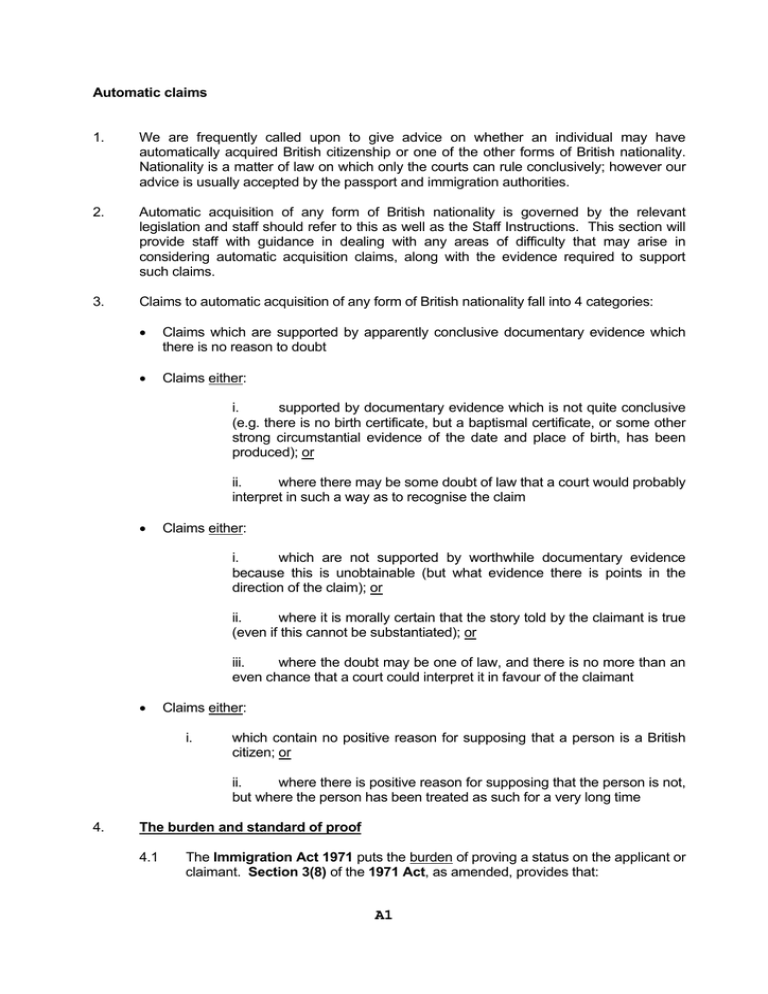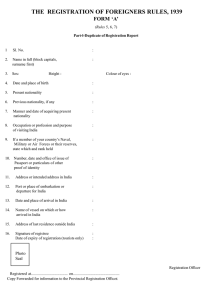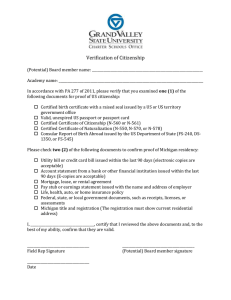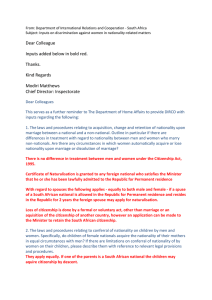Automatic claims
advertisement

Automatic claims 1. We are frequently called upon to give advice on whether an individual may have automatically acquired British citizenship or one of the other forms of British nationality. Nationality is a matter of law on which only the courts can rule conclusively; however our advice is usually accepted by the passport and immigration authorities. 2. Automatic acquisition of any form of British nationality is governed by the relevant legislation and staff should refer to this as well as the Staff Instructions. This section will provide staff with guidance in dealing with any areas of difficulty that may arise in considering automatic acquisition claims, along with the evidence required to support such claims. 3. Claims to automatic acquisition of any form of British nationality fall into 4 categories: • Claims which are supported by apparently conclusive documentary evidence which there is no reason to doubt • Claims either: i. supported by documentary evidence which is not quite conclusive (e.g. there is no birth certificate, but a baptismal certificate, or some other strong circumstantial evidence of the date and place of birth, has been produced); or ii. where there may be some doubt of law that a court would probably interpret in such a way as to recognise the claim • Claims either: i. which are not supported by worthwhile documentary evidence because this is unobtainable (but what evidence there is points in the direction of the claim); or ii. where it is morally certain that the story told by the claimant is true (even if this cannot be substantiated); or iii. where the doubt may be one of law, and there is no more than an even chance that a court could interpret it in favour of the claimant • Claims either: i. which contain no positive reason for supposing that a person is a British citizen; or ii. where there is positive reason for supposing that the person is not, but where the person has been treated as such for a very long time 4. The burden and standard of proof 4.1 The Immigration Act 1971 puts the burden of proving a status on the applicant or claimant. Section 3(8) of the 1971 Act, as amended, provides that: A1 "When any question arises under this Act whether or not a person is a British citizen [or otherwise has the right of abode] ... it shall lie on the person asserting it to prove that he is." 4.2 We should not normally undertake to initiate enquiries in order to establish claims unless there is some special reason (e.g. if a UK official abroad has come to the wrong conclusion about a person's status). Otherwise, claimants should seek to obtain the necessary information or documents themselves. It should be noted, though, that a where a right of abode has been demonstrated by the production of a British citizen passport or certificate of entitlement, it is for the Home Office or immigration officer to disprove the existence of that right, for example by showing that the passport or certificate is a forgery (R -v- SSHD ex p Obi [1997] Imm AR 420). 4.3 As to the standard of proof required, it was held by the Immigration Appeal Tribunal in Kessori Khatun (4272) that "the standard of proof applicable to the right of abode, whether that right be dependent on citizenship or relationship, is that of the normal balance of probabilities". In other words, a right of abode is established, or a claim to citizenship made out, if the evidence that it exists outweighs, however slightly, the evidence that it does not. Any requirement that applicants/claimants produce "conclusive" evidence of their status, or establish their position "beyond doubt", sets the standard too high and risks censure by the courts if the case were to go to judicial review. In official correspondence, such words and phrases are therefore best avoided. 4.4 Although, in Kessori Khatun, the Tribunal was concerned with the right of abode, the same standard is thought to apply to proof of citizenship for other purposes (e.g. for passport/consular protection purposes, voting etc). 5. Before recognising any claim to British nationality the index in INPD(L) should be checked to ensure that the person concerned has not made a declaration of alienage or renunciation. 6. In response to an enquiry about British citizenship: 7. • If a claim to citizenship has been established by production of all the appropriate documents, we should send a letter along the lines of the draft at Annex C of Chapter 3 of Volume 1 • If it is a complicated claim to citizenship (e.g. involving difficult legitimacy or marriage law, several independence acts etc), or if the person concerned has been unable to supply detailed evidence to support the claim, but we are nonetheless satisfied that the claim is valid, we should send a "status" letter, as explained in Annex E of Chapter 3 of Volume 1 Claims by people whose stay in the UK is restricted 7.1 8. When a person claiming automatic acquisition of British nationality is on immigration conditions, and it seems appropriate to recognise the claim, the file should be sent to the relevant ICD team to add a paragraph about the conditions. Claims to British citizenship by birth in the UK A2 8.1 Persons born before 1 January 1983 will need to produce a full birth certificate showing that they were born in the UK. (See Chapter 2 of Volume 1) 8.2 Persons born on or after 1 January 1983 will need to produce a full birth certificate and evidence that one of their parents was a British citizen or settled in the UK at the time of the birth. If that parent is the father only and the person was born before 1 July 2006 , claimants will need to produce their parents' marriage certificate or other evidence of legitimacy. (See Chapter 3 of Volume 1); if the person was born on or after 1 July 2006, we shall require evidence that the father comes within the definition at Annex F to Chapter 6 of Volume 1 NB. Care should be taken with regard to the parents' occupation on the birth certificate. If the description suggests that this is of a diplomatic nature the section "DIPLOMATS" should be consulted. 9. Claims to British nationality by descent 9.1 It will be necessary to see a complete chain of documents beginning with the birth certificate (or certificate of naturalisation or registration) and the marriage certificate of the person from whom descent is claimed, the birth certificate of the claimant and the birth and marriage certificates of the relevant antecedents between the claimant and the source of the claim. (See Chapters 2 and 4 of Volume 1) NB. A certificate of naturalisation granted overseas must be either an "imperial" certificate or a "local" one to which s.32(6) of the BNA 1948 applied. 10. Claims to British citizenship by marriage 10.1 11. 12. A woman who was married to a British subject before 1 January 1949 may have acquired CUKC by virtue of the marriage under s.12(4) or 12(5) of the British Nationality Act 1948, and subsequently British citizenship under s.11(1) of the British Nationality Act 1981. (See Chapter 2 of Volume 1) Claims affected by acquisition of another citizenship by naturalisation abroad 11.1 Persons born abroad before 1 January 1949, who claim British nationality by descent from a father who was born in the UK or a colony, should be asked whether the father had acquired another citizenship by naturalisation abroad and, if so, on what date. If the father was naturalised abroad before the claimants' birth, then the claimant will have no automatic claim to British nationality by descent. 11.2 Persons who produce a "British" birth certificate and who travel on a foreign passport should be similarly questioned if they are old enough to have been naturalised abroad before 1 January 1949. Claims by people born in the Republic of Ireland before 1.1.49 12.1 Persons born in Southern Ireland before 6 December 1922 will have acquired CUKC under s.12(4) of the British Nationality Act 1948 provided they were neither: • domiciled there on that date; nor A3 13. • registered as a citizen of Eire before 1 January 1949 If they were born before 31 March 1922, they would have had the right of abode under s.2(1)(a) of the Immigration Act 1971 and will have become a British citizen under s.11(1) of the British Nationality Act 1981. Persons born between 31 March 1922 and 5 December 1922 inclusive will have needed to have had the right of abode under ss.2(1)(b)-(d) or 2(2) of the 1971 Act in order to have become a British citizen. 12.3 A citizen of Eire born before 1.1.49 may be a British subject as a result of having made a claim under s.2 of the British Nationality Act 1948, or s.31(3) of the British Nationality Act 1981. Loss of CUKC before 1.1.83 by persons connected with a former dependency With the exception of persons connected with Tonga, persons who were CUKCs by reason of a connection with a former dependency (i.e. countries which have gained independence since 1.1.49) will normally have lost CUKC status on automatically acquiring citizenship of the newly independent country. However, they will not have lost that status if they possessed a specified connection with the UK or a remaining colony. These specified connections are usually shown in the retention provisions of the relevant UK Independence Act for the country concerned. (The retention provisions for Ghana are shown in s.2 of the British Nationality Act 1958, and those for Cyprus are in the British Nationality (Cyprus) Order 1960). The standard categories of person excepted from loss are discussed under "INDEPENDENCE". Other claims 14.1 15. permanently resident there on or after 10 April 1935 and before 1 January 1949; nor 12.2 13.1 14. • A person may have acquired a form of British nationality through adoption or legitimation. Further details will be found in the appropriate entries. Evidence of citizenship 15.1 This section provides guidance on the evidence which we may accept in support of a person's claim to British citizenship or some other nationality status. It complements Chapters 2-5 of Volume 1 dealing with automatic acquisition. Official documents 15.2 The usual documents which would be acceptable are valid passports (but see paragraph 15.3 below), birth or baptism certificates and marriage certificates which establish legitimate descent. It should, however, be noted that even unabridged birth certificates do not necessarily prove that a child is the natural child of the marriage, and it is possible that the child may have been adopted abroad. Where there is any suggestion that this is so, for example • where the birth certificate was not issued shortly after the birth, and does not show the date of registration, or A4 • where the details of the parents' marriage and the place of birth are not shown, it will be necessary to obtain a statement from the father that the child is the natural issue of the marriage and has not been adopted. We must also be alert to the danger of forgeries, which are common. All documents should be examined closely and with extreme caution. INPD(L) (HEOP1) should see any cases where it is known that AID or any other form of artificial insemination is involved. 15.3 Caution should be exercised in accepting that a person is a British citizen on the strength of a passport which is endorsed to the effect that its validity is not to be extended without reference to the Passport Agency. This endorsement may mean that the holder has not properly established a claim to British citizenship. In such cases, the issue of a "production of" letter may cause embarrassment to IND and UKPA. Alternative evidence 15.4 In the absence of the usual documents we should be prepared to consider whatever evidence is available. Certificates of infant baptism etc 15.5 As christening and similar ceremonies normally take place shortly after birth, a certificate issued at the time or a certified official extract from church records could be an indication, but not proof, of the likely birthplace. The longer the interval between birth and the ceremony, the less valuable is such a certificate as evidence. If no certificate is held, but it is believed that a ceremony of this description took place, claimants should be advised to write to the clergymen or ministers of the churches in the neighbourhood where they think they were born asking if the registers could be searched and a certified copy of any relevant entry supplied. The local council offices would probably be able to supply an address to contact. School and institution records 15.6 The education authority (the address may be obtained from the local authority offices) of the area in which the claimant went to school, or the school itself, may have preserved old admission records that could throw light on the place and date of birth and on parentage as declared to them at the time. Claimants who were cared for as a child by an orphanage or similar institution might be able to obtain useful information, including details of the circumstances in which they were admitted, from the secretary. 15.7 Most local authorities still preserve old personal records formerly in the care of Parish Councils, Poor Law Boards of Guardians, and Public Assistance Committees. All these bodies were concerned with helping poor families, unmarried mothers and their children, and many other persons in difficult circumstances. The Chief Welfare Officer of the local authority is sometimes able to assist in tracing in these records entries relating to the birth, parentage or family of an enquirer. Other evidence A5 15.8 If a claimant can show (e.g. by producing correspondence) that enquiries as above have been unsuccessful, we may exceptionally be able to accept the evidence provided by private papers such as old letters, accounts, diaries and indentures, entries in a family Bible, references in a will, or in reports or announcements in local newspapers, parish magazines etc (files of old issues are often available for inspection at the publisher's premises), or indeed any document that bears on the question. On one occasion a photograph of the inscription on a tombstone was accepted. 15.9 Consideration will also be given to statutory declarations, concerning the date and place of birth, made by anyone having personal first hand knowledge of the event (ie someone considerably older than the claimant). A statement merely to the effect that the person making it has always understood the facts to be as reported is useless as evidence. 15.10 Where evidence is slender, it is important to collect documents and confirmatory statements from as many quarters as possible. British Dependent Territories citizenship by birth in Hong Kong or another existing dependent territory 15.11 Persons who claim to have held British Dependent Territories citizenship by reason of their own or their father's birth in Hong Kong and do not hold a United Kingdom passport should be asked to obtain confirmation of their status from the British Consulate-General. It should, however, be noted that British Dependent Territories citizenship was lost automatically on 1 July 1997 by those who held it by virtue of a connection with Hong Kong. Such persons may continue to possess British nationality if they have previously registered as a British National (Overseas) or became a British Overseas citizen on that date (i.e. because they would otherwise have become stateless). The usual documentary evidence (i.e. birth or baptismal certificates or a passport) may be accepted from a person who was born in some other existing dependent territory. Evidence of the status of British subject without citizenship 15.12 If this is needed, the passport will usually provide it and should be seen if available, but the following evidence is acceptable as a last resort in certain circumstances: • Birth or baptismal certificates with marriage certificates, if applicable • Old British Indian passports • Seamen's documents of the kind described in paragraph 15.1.13 below • Certificates of naturalisation granted under s.2 of the British Nationality and Status of Aliens Act 1914 • Certificates of registration • Family records • Affidavits as to birth by persons having first hand knowledge of the place of A6 birth Evidence of the status of British subject by virtue of section 1 of the British Nationality Act 1965 15.13 Suitable evidence that a person possesses British subject status under s.1 of the British Nationality Act 1965 are: • certificates of registration • a passport describing the person as a British subject Evidence of citizenship of a Commonwealth country or the Republic of Ireland 15.14 If this is needed, the passport should be seen if available, but the documents listed below may be accepted as a last resort. In cases of doubt (e.g. where citizenship does not depend on birth alone in the territory concerned), the relevant legislation should be consulted. • Statements confirming citizenship, issued by the High Commissioner of the country concerned or, in the case of the Republic of Ireland, the Irish Embassy are normally the best form of evidence in the absence of a current passport. Statements provided by the Indian High Commission sometimes contain such qualifying statements as ".... on the basis of entries in your baptism certificate ... you have a claim to Indian citizenship provided you have not acquired the nationality of any other country ....". Such statements may be accepted as sufficient evidence of Indian citizenship where, having regard to all the circumstances, there is no reason to doubt the person's claim or to suppose that another nationality has been acquired (for example, if it appears that the claimant left India for the first time in order to come to this country, and has remained here virtually continuously since arrival, the claimant would have had no opportunity to acquire another nationality) • Birth or baptismal certificates • Old colonial (citizen of the United Kingdom and Colonies) passports • Certificates of naturalisation • Certificates of citizenship • Certificates of registration • Indian army certificates of discharge • Seamen's documents: i. Certificate of nationality and identity issued to a British Indian seaman ii. Certificate of nationality and identity issued to a Pakistani Seaman iii. Pakistani Seaman's continuous certificate of discharge A7 iv. Certificate of nationality and identity issued by a British colonial government NB. If the document submitted is a British Indian Seaman's certificate, a green skin file will have been opened at the time of issue. If the correspondent is an Indian born in former British India (which includes those parts of Pakistan which were under British jurisdiction) who has been in the United Kingdom since before 1949 and is without evidence of status, he should be asked if he was ever a seaman. If he claims that he was, Registry should be asked to look for the original file on which a BIS certificate may have been issued. If there is no such file, the applicant should be referred to the Indian or Pakistan authorities, as the case may be, for evidence of citizenship. DNA profile as evidence of citizenship by descent 15.15 Each person's DNA profile is derived from his or her parents. A sample (usually of blood) can be reacted with a "probe" to produce a DNA profile or "fingerprint" resembling a supermarket bar code. Children will inherit about half of their DNA bands from their father and half from their mother. Thus DNA fingerprinting can be used to establish a child's parentage. 15.16 DNA fingerprinting is carried out by University Diagnostics Limited and their reports are accepted as scientifically valid by the Home Office. A positive report can be accepted as showing that a relationship is as claimed; a negative one can be accepted as showing that it is not. 15.17 Entry Clearance Officers may offer DNA tests in cases where the relevant relationships cannot easily be demonstrated. 15.18 Cases where it is felt that determination of a claim to citizenship might be assisted by obtaining a DNA profile should be referred to INPD(L) (HEOP1) on the decision of a senior caseworker. A8



